In Conversation: Director Nick Bowling, Movement Director William Carlos Angulo, and Music Director Otto Vogel
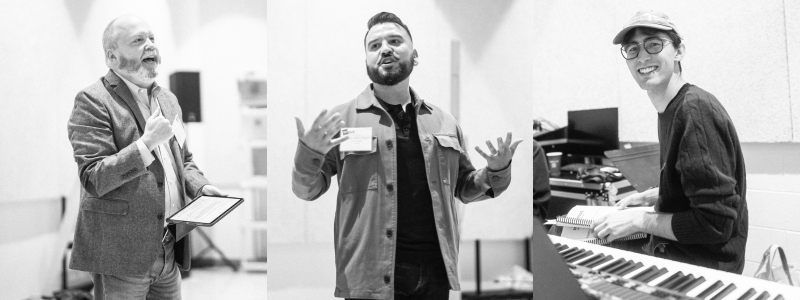
Just after the first day of rehearsal, Director Nick Bowling, Movement Director William Carlos Angulo, and Music Director Otto Vogel sat down to discuss Falsettos. This show is as surreal as it is grounded, playful as it is heartbreaking, and their conversation was equally wide-ranging, covering Stravinsky; the terror, newness, and joy of coming out; surrealism; and roller skating. It did not disappoint.
Below is an excerpt of their conversation. Read on to get a glimpse into the process and hear directly from the creatives bringing William Finn and James Lapine’s modern masterpiece to life.
Otto: Falsettos is classic theatre—it was monumental, and still is. It’s a very moving portrait set to music that is so weird and zany. It’s funky and it’s so strange. It’s a musical language that I’ve had to learn, and all the actors are learning, and it’s going to be very special.
Nick: And it’s also very catchy! There are moments of very classical musical theatre, and then more strange pieces of music—as you were saying—but the truth is, many of the songs are earworms. I find it going through my brain all the time.
Otto: “The Year of the Child” is one of my favorite songs; it’s very catchy, very pop-y. And “The Baseball Game” really pushed me to the limits of the inventiveness of musical theatre. The rhythm of this whole musical is very much like Stravinsky—I can’t explain it.
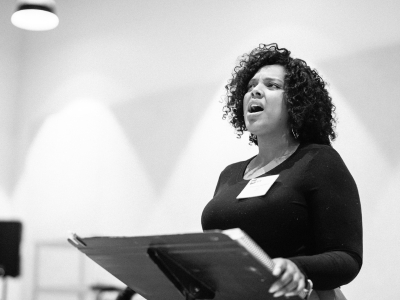
William: It feels so contemporary to me. It feels like it could have been written this year, really, and not just musically (even though, musically, it does sound like a contemporary opera).
Otto: I love opera, but contemporary opera wishes it could be like Falsettos [laughs]. It made the rule book. This show is music, after music, after music. There are crazy shifts. You get this whiplash that you’re not expecting as an audience. And, as an audience, it doesn’t give you permission to sit back and applaud.
Nick: Usually, you have scene, song, scene, song, and those scenes allow you to sit back and listen. With a sung-through musical, you keep sitting forward throughout. There’s an engine to it that continues moving forward, and it feels almost like the movement never stops. And, Otto, that’s your job [laughs], to keep this thing propelling forward.
William: When everything is underscored and everything is sung through, there’s so much emotional richness and information coming from the music. There’s so much to excavate. Getting to figure out how to color that in physically provides a lot of opportunities.
Nick: What would you say is the physical style of the show, does it have one?
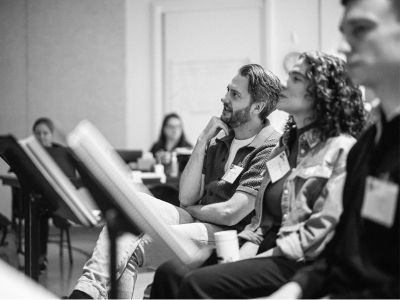
William: You’ve talked a lot about Impressionism — how Falsettos is about these people doing an impression of family, or an impression of a relationship, or an impression of a marriage. These people are performing these roles, more than anything, so—physically—we’re playing with the moments when the actors pull out of that performance and talk directly to the audience. Jason is very forthright with his feelings. Apart from him, all of these people are trying to present a version of themselves that they want everyone else to see. In the case of Whizzer and Marvin, there weren’t a lot of examples of how queer relationships could work, so we see Marvin calling Whizzer his “friend” and not knowing how to talk to his son about these things. They’re figuring out how to perform.
Nick: In a way, he can’t help but perform. For the past forty years, he has been living a lie and performing. He’s trying to be real, but he doesn’t know how because, emotionally, he’s an adolescent, like his own son. This whole show is about moving from adolescence to adulthood. The beautiful and sad part is that Marvin’s doing that because he was put into a closet—whether he was put there by himself, or society, or all of the reasons that a gay man wouldn’t want to come out in 1979—and he has stunted his own growth. He comes out and the first thing he says is, “I want everything. I want it all.” And, in a way, I think he deserves that because, for forty years, he didn’t get to say what he wanted. Marvin is such a flawed character, and I think it’s mostly because he’s like a young boy, a child, trying to figure all of that out.
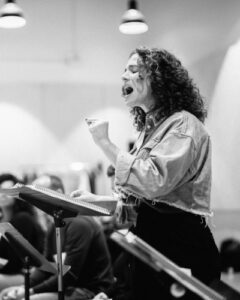
William: Thinking about the title, “falsettos” is playing with the way that some gay men talk, and it also literally refers to an unchanged voice; someone who hasn’t gone through puberty yet. I’m excited about the “March of the Falsettos” number because we’re treating it like a dream sequence: Trina sings about these little boys who rule the world, and how the people in charge—including the men in her life—are really just immature boys. In this number, the men are dressed to look like little boys who are performing the role of adults with power. So, when thinking about the physical world, we’re trying to figure out that sense of play. I’m interested in the Marvin/Jason relationship; the idea that Jason is a mini version of his dad, and that’s why Trina’s so worried about him. You talk a lot about these characters having the spirit of a boy, and how they’re playing a really elaborate game until the very end of the show.
Nick: Most of the show is that game. It’s treated like a game of chess, it becomes a game of racquetball, and we even get power running (all these great ’80s references!). There are mind games throughout, too. We’re using games as an inspiration for the show, even down to the set design.
William: There are really exciting opportunities for world-building through the set, but also the movement. Falsettos takes place in such a juicy period. We’re coming out of the disco era, and moving into Jazzercise and hip-hop, and then we’re in the ’80s and the whole family goes to the roller rink. Maybe one of them is really amazing, and maybe one of them has to hold the wall the whole time, and maybe Jason has to hold Mendel’s hand the whole time, and they’re all figuring it out together, which, in a way echoes the spirit of the piece. They’re all just kind of a bit wobbly and trying to figure it out.
Nick: It’s the gayest thing I can remember from 1980…there were disco lights and mirror balls, and everybody’s on skates and dancing and wearing outlandish clothing, short shorts, and bright colors. There’s a freedom about skating. The first half of the show should feel really fun, and all the furniture’s on wheels, and the actors are on wheels, and the whole thing moves like crazy. And that’s how coming out of the closet feels for Marvin.
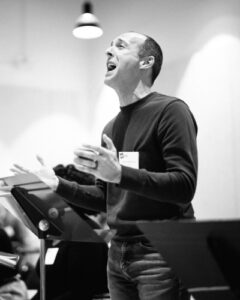
William Finn wrote a musical with a gay protagonist, who is not a victim and is in control of his own destiny. That was a very unusual thing. There were very few plays and few musicals before this that had a leading, gay character who was not a fop, a comic, or a tragic victim, but was someone who was flawed, and mistaken, and trying to be better. And that makes it so important. This play addresses coming out in this period, and the sexual revolution, and the terror and the newness of it all. I was there. It was a scary time to step out and say, “I’m gay. I want to live a life like this. I want the world to know it.” Marvin talks about wanting to keep part of the past and marry it with his present to create a new type of modern family. The show is filled with the past and present all at the same time, so it unleashes our creativity and our freedom to let it be surreal. William Finn is so intellectual and the lyrics are very, very fast and smart, but he’s more interested in how something makes you feel, rather than how it makes you think. He’s interested in getting to your gut by going through your mind.
William: If you could be any role in the play, what role would you be?
Otto: Cordelia. She has a little princess track, which is so fun.
William: Dr. Charlotte might be my favorite. If I could play anyone, though, it’d probably be Jason. He’s the only one who’s not really performing.
Nick: Jason, the character, would have been born the same year that I was born. I have to say, though, I don’t connect as much with Jason, even though that should make sense. I connect so strongly with Marvin. I remember those feelings of coming out of the closet, and wanting to figure out my life. It took me until I was 22 and it affected me in a lot of ways. I couldn’t even choose what characters I wanted to play as an actor, because I didn’t know who I was yet; I didn’t want to admit who I was.
William: There was nobody like Marvin, prior to this show. We typically want queer characters in musicals to be young and beautiful and falling in love, and I can’t think of any adult men in musicals who are portrayed how Marvin is portrayed, which makes this show feel very up-to-date.
Nick: There’s an idea that has become more common: Whose shoulders am I standing on? In a way, we’re standing on Marvin’s shoulders, as shaky as they may be. He’s a mess, but he’s standing up. He’s trying to create a life.
Join us in Falsettoland! Performances run from Friday, November 8 – Sunday, December 8.
Tickets are on sale now and can be purchased online or by calling the Box Office at (773) 753-4472. Subscriptions including this production are also available – subscribe and save up to 44%! Learn more.